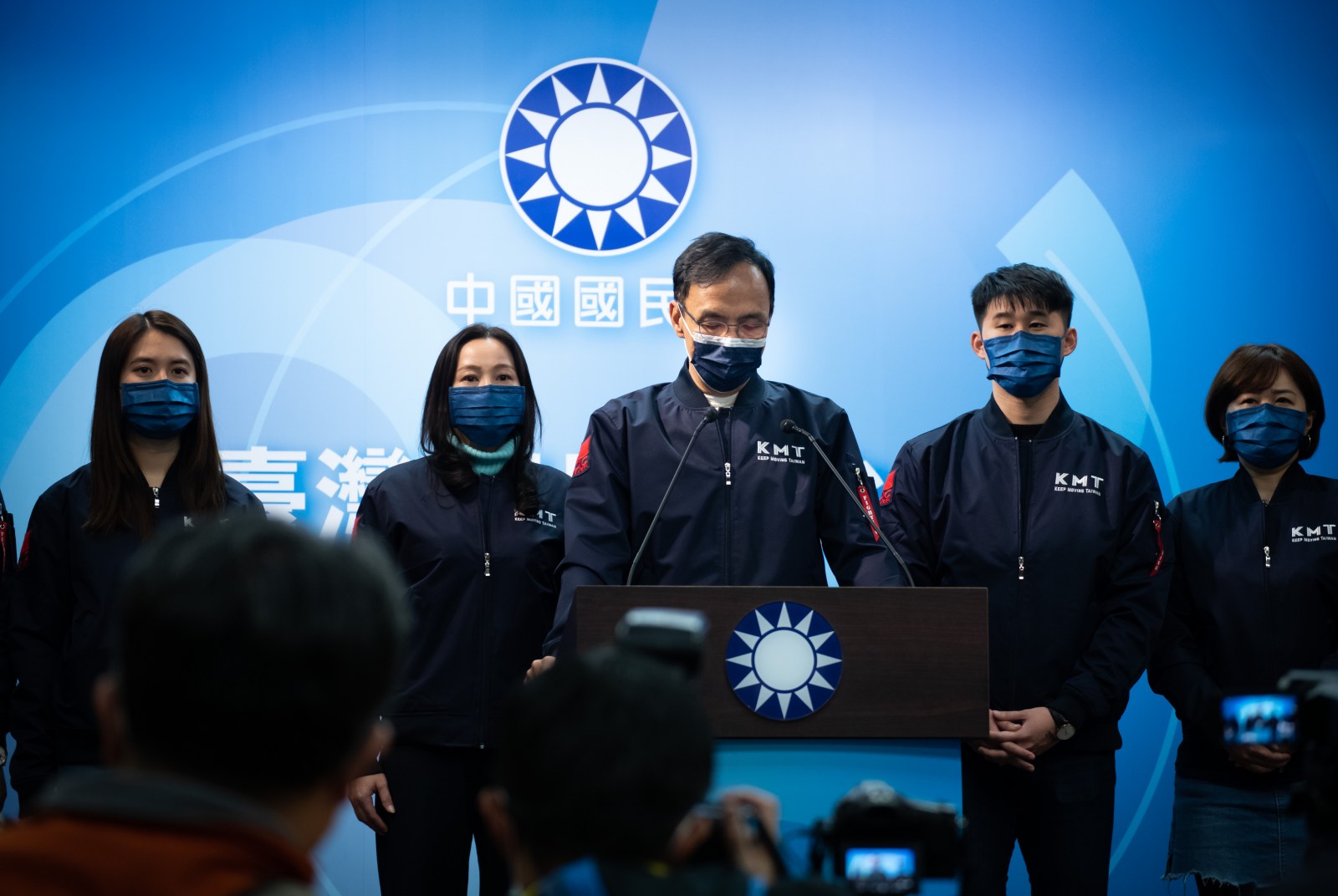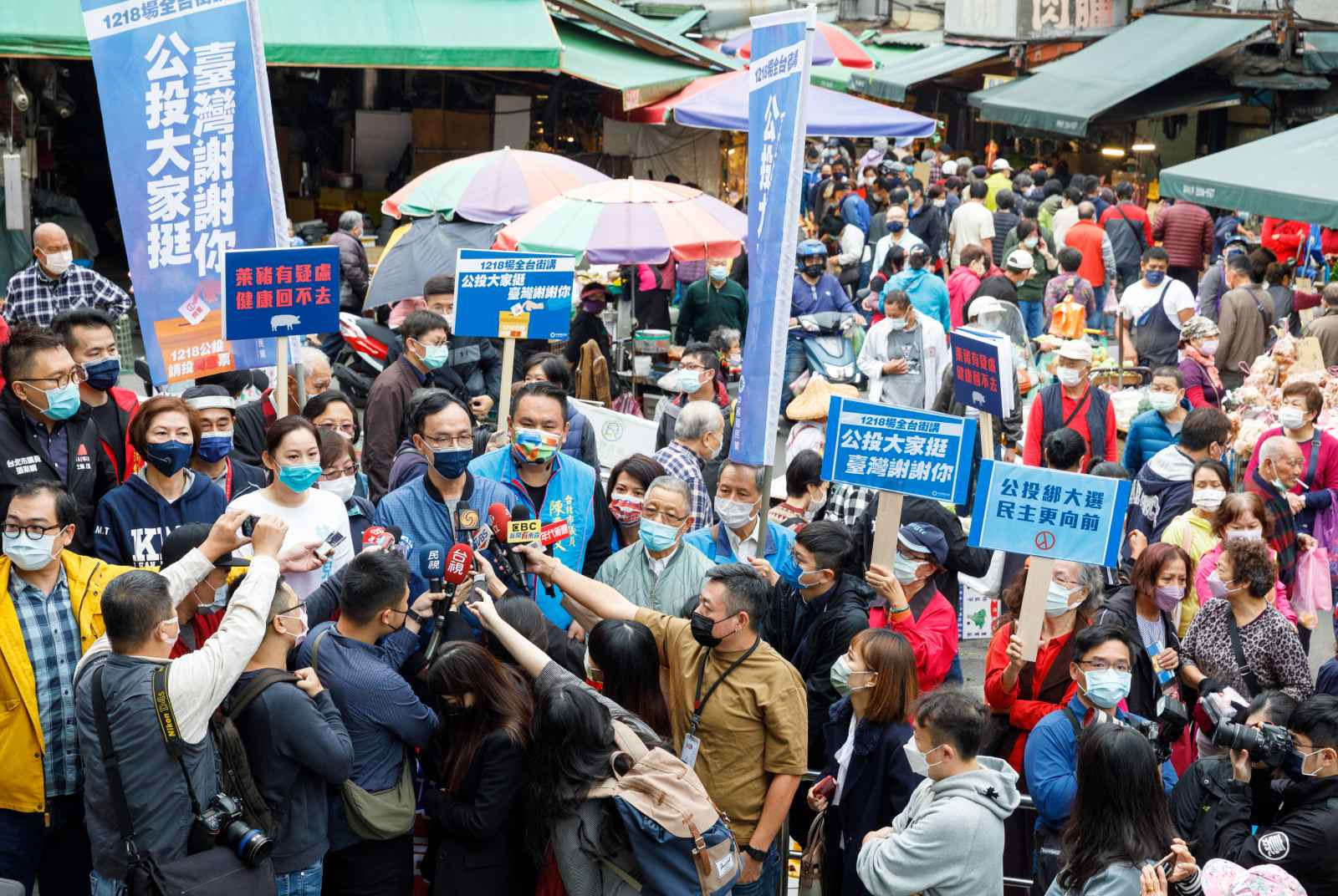The four referendums have failed: What’s next for the KMT?

Source:Ming-Tang Huang
The referendum of 2021 has come and gone; on all four referendum questions, more people voted “no” instead of “yes”. It’s a resounding defeat for the Kuomintang, but the reprieve for the ruling Democratic Progressive Party is temporary. With the 2022 local elections looming large, it’s still anyone’s guess who will come out on top.
Views
The four referendums have failed: What’s next for the KMT?
By Li Hsun Tsai and Rebecca Linweb only
This past weekend, the referendum that has been characterized as a showdown between Taiwan’s two major political parties came to a conclusion. The Kuomintang (KMT) was dealt a decisive defeat.
According to the Central Election Commission, not only did the number of people who voted against the four referendums surpass the number of people who voted in favor of them, none of the referendums gathered enough votes to pass the threshold of 25% of Taiwan’s eligible voters, due in part to the relatively low voter turnout. In other words, all four referendums were dead on arrival.
For KMT Chair Eric Chu, the referendum was a way for the opposition party to determine its way forward and shore up support within the party. All of this is in preparation for the local elections that will be held across the country in 2022.
In essence, the referendum this year boiled down to three core issues. The first is the historical legacy of incumbent president Tsai Ing-wen; the second is the continuation of policies spearheaded by the central government; the third is the demonstration of the political parties’ ability to mobilize their electorate.
The results proved that the KMT’s attempt to mobilize its supporters ended in abject failure. In the areas of Taichung, Changhua, Nantou, and Yunlin in central Taiwan, only voters in Nantou County supported the KMT on the core issues—more people voted for instead of against the referendum questions.
In spite of all this, the KMT has an even bigger crisis to contend with. Its rising political superstar, New Taipei Mayor Hou Yu-ih, has failed to toe the party line.
Out of the four referendum questions, Hou only expressed his explicit support for the referendum that sought to ban the import of pork containing certain leanness-enhancing additives. Hou was conspicuously silent on whether or not he supported restarting work on Taiwan's Fourth Nuclear Power Plant. This has earned him the ire of members within his own party.
KMT falls into quagmire of political rivalry
Hou is the mayor of Taiwan’s largest city; he has routinely delivered stellar performance in opinion polls. Members of the KMT have interpreted these accomplishments as signs that Hou will run for president in 2024. Political insiders have noted that Hou is playing the long game: though a run for president will require Hou to shore up support within his own party, at the current juncture, Hou’s personal popularity is greater than that of the entire KMT.
“Presently, the fierce barrages of criticism leveled at him by hardline KMT party members and supporters are not necessarily a bad thing. It is a useful form of cognitive dissonance that may lead swing voters and moderate DPP supporters to believe Hou is on their side, and support him with their votes,” observes Ho Po-wen, head of the DPP’s New Taipei City chapter.
In fact, only two of the four referendums voted on had been proposed by the KMT: the referendum to ban the import of certain pork products, and the proposal to hold referendums concurrently with national elections.
“These two issues are our focus, so that’s where we concentrated our attention. We respect the other two issues highlighted in the referendums; in this sense, Mayor Hou has not violated the basic principles of the KMT,” says KMT lawmaker Lin Wei-chou, who has just recently resigned his post as KMT Deputy General-Secretary.
But the KMT’s decision to respond to the DPP’s slogan of “voting ‘no’ on all four referendums” with its own motto of “voting ‘yes’ on all four referendums” may have been ill-advised. Says Lin, “It was catchy and memorable, and it demonstrated our complete opposition to the DPP agenda, but it dragged us into the quagmire of political rivalry, which was what the DPP wanted.”
 (Source: Chien-Ying Chiu)
(Source: Chien-Ying Chiu)
In the face of such devastating defeat at the referendums, a KMT insider says the party’s next move will have to be quick and agile repositioning. “Our main focus now is the local elections in 2022.”
A lawmaker aligned with the KMT observes that, while it is relatively straightforward for KMT-affiliated mayors and magistrates to win reelections, “Legislative seats may be lost to the DPP, because Taiwanese society as a whole is tired of the conflict between the two parties.” As the KMT sinks deeper and deeper into the quagmire of political rivalry, and as more combative elements of the “blue camp” give voice to their extreme views, Taipei Mayor Ko Wen-Je, who has founded his own Taiwan People’s Party, stands to absorb the more moderate elements of the KMT camp. “We are worried that the KMT risks a rerun of the New Party debacle in the nineties.”
A taste of things to come: Does the DPP have the 2022 elections in the bag?
Both the DPP and the KMT saw the referendum as a harbinger of what is to come in the 2022 local elections.
“The DPP has used the referendum as a chance to drill its troops,” says political commentator Chen-hua Yu. His view on the 2022 local elections is this: “The DPP faces strong headwinds, because it lost a lot of ground in 2018.”
Four of the seven DPP-affiliated mayors and magistrates who are currently in power are facing the end of their last terms, unable to introduce worthy political successors. On the other hand, only three of the fourteen KMT-affiliated mayors and magistrates are lame ducks. What’s more, the seven female leaders in the blue camp, affectionately known as the “Seven Flowers”, have had a strong showing. This is bad news for the DPP.
Because of this, the DPP could not have withstood a defeat in the referendum. Ever since DPP-affiliated legislator Chen Po-wei was ousted in a recall election in October, KMT Chair Eric Chu had made it clear that the next decisive battle would be over the referendum. “Even President Tsai knew she had to face this challenge head-on,” says one political scholar.
 (Source: Chien-Ying Chiu)
(Source: Chien-Ying Chiu)
In early November, the DPP rallied its forces and hosted a series of local conferences across Taiwan. President Tsai, Vice President Lai Ching-te, and Premier Su Tseng-chang toured the country to make their case for voting against the referendums. Other ambitious political newcomers also threw their full weight behind the effort.
DPP-affiliated legislator Liu Jian-guo, whose electoral district is in Taiwan’s largest pork-producing district of Yunlin County, said in an interview in early December that he had spoken at more than 70 conferences. “I have never stopped working on my talking points,” he said. He adjusted the way he delivered his message so constituents from every walk of life could understand the referendums and his position on these issues.
The “green camp” has left no stone unturned, not only because they did not want the referendums to affect their policies, but also because there was the long game to consider. “The turnout itself was a victory. Every vote that supports your position is political capital you can use in the future,” explains a DPP political advisor.

However, even though the DPP won handily in the referendums, this does not necessarily mean the electorate is wholly on board with the ruling party’s policies.
The DPP asked voters to vote “no” on all four referendums. But in the cities of Taoyuan, Keelung, and Hsinchu, where the clock is ticking for DPP-affiliated mayors, the number of votes in favor of the referendums surpassed the number of votes against.
The CommonWealth team has crunched the numbers on Taiwan’s 368 administrative divisions. Compared with the local elections in 2018, as many as 143 divisions are experiencing a paradigm shift, with more areas shifting toward the KMT instead of the DPP.
In comparison with President Tsai’s successful run for reelection in 2020, in which the DPP won 280 administrative divisions, 52 of these divisions have broken with the DPP and voted “yes” during this year’s referendum. However, it should be noted that turnout was only 41.09%, which was far less than the previous occasions.
Rather than thinking they have been given carte blanche because they trounced the opposition during this year’s referendum, the central government should think of these votes as a reminder that they still have a lot of work to do, starting with clearer communication with the stakeholders in these issues. After all, Taiwan is a democratic society, and the will of the voters can always turn against you in the next election.
Have you read?
♦ How can the KMT rebuild its US ties after a 13-year absence?
♦ Is Taiwan’s Pork Industry Up to the U.S. Challenge?
♦ A carbon neutral future: Can Taiwan get there?
Translated by Jack Chou
Edited by TC Lin
Uploaded by Penny Chiang






